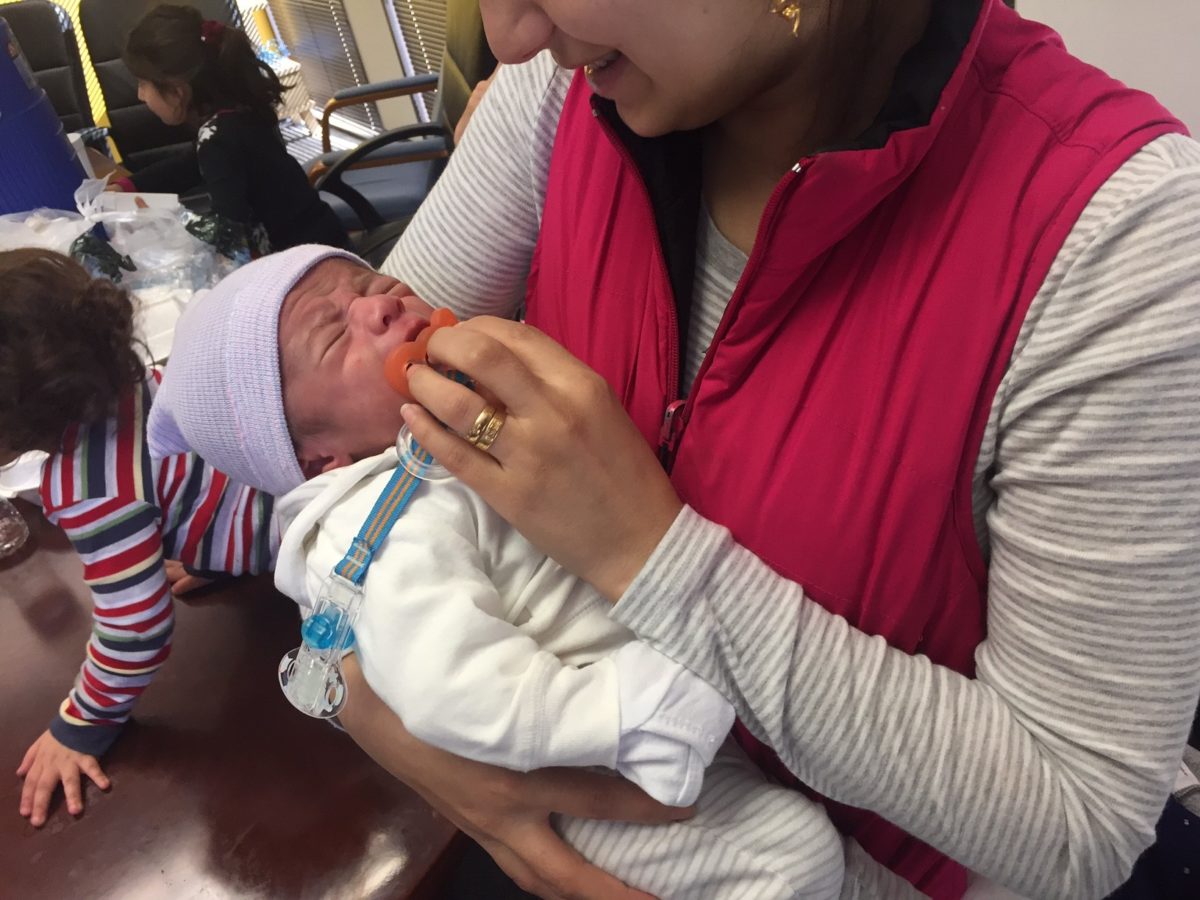Immigration Order Brings Worry To Atlanta’s Syrian Refugees

Elly Yu / WABE
Areen Lukman Hussein tries to quiet her baby, who’s not even a month old. She just fed him with a bottle, but he’s still squirming in her arms.
She’s at the International Rescue Committee in Atlanta with her family on Monday, where refugees have been gathering to hear more about President Donald Trump’s executive actions on immigration.
Another man from Syria in the room, also a refugee, chimes in about the baby.
“Maybe the baby misses his dad,” he says in Arabic through an interpreter.
Trump’s executive order on immigration Friday put a 120-day halt on refugees from resettling in the country – with an exception for more than 800 refugees who were already en route to the United States this week. But the order indefinitely suspends refugees specifically from Syria.
Lukman Hussein came to the U.S. with her parents and younger siblings about five months ago. She was pregnant at the time, but her husband couldn’t come with her. So when she heard of the news about the executive order, she said she couldn’t help but become worried.
“I don’t want to raise the baby only by myself,” she says speaking in Arabic through an interpreter.
When her family first applied for refugee status after fleeing to Iraq from Syria, she wasn’t married yet. The process to get approved took about three years, she said. In the meantime, she got married. She tried to add her husband to their refugee case, but says it was refused. She says she was told to come to the United States first, and then try to apply to bring him afterwards.
With the news, she says she’s at a loss for what to do. She’s even considering heading to Iraq, where her husband is now, so she can be with him.
But her father, Lukman Hussein, says he likes it here. He left Syria without much of a choice. Because of the violence from the war, he says he sent his family to Iraq and stayed in Syria to run a factory he owned, which made bricks and other construction materials.
A year later, ISIS fighters seized his business and threatened to execute him, he says. They took his equipment and his truck, and told him to get out. He says he was scared to leave because he thought he would be killed from behind.
“I kept thinking – this is going to be my last step. This is going to be my last step,” he says in Arabic through an interpreter.
He says he walked that way for about an hour until he was safe.
Another family here at the resettlement agency is Alaa Alshqair and her husband Jihad Matar. They fled Syria four years ago and now live in Decatur.
Where they lived in Daraa, Alshqair says bombs would constantly wake them up in the middle of the night. They would grab their kids and take them to first floor of their building until the shelling stopped.
One night, she says, the bombing continued from 7 in the evening all the way until dawn.
“We were doing that to the kids so much that they got scared, they became nervous,” she says.
Matar thanks God that he’s in the United States, saying he now feels secure. He has a job at a local furniture store.
For the young mother, Lukmam Hussein, she says she’s happy for her family here – her siblings are going to school, her dad’s working – but things aren’t yet right for her.
She says she prays the president might change his mind on Syrian refugees. And she hopes that her son will get to meet his dad. She named the two-and-a-half week-old baby Redur.
“It’s like distance,” she says.
She explains it’s a Kurdish name that conveys a long distance because he’s far away from his homeland and his father.
9(MDAxODM0MDY4MDEyMTY4NDA3MzI3YjkzMw004))








